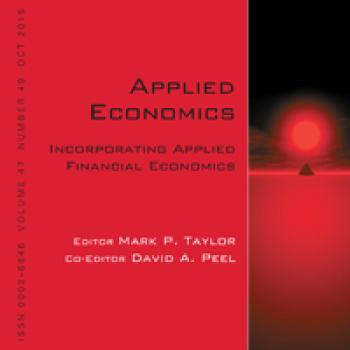Publication Information

Does when a child was born relative to his or her siblings affect whether the child attends school or participates in child labour? We investigate this question by estimating the causal effect of birth order on the probabilities of school attendance and child labour participation. To address the potential endogeneity of family size, we use instrumental variable approach where the proportion of boys in the family is used to instrument family size. Using a longitudinal household survey data from Ethiopia, we estimate unobserved effects bivariate probit instrumental variable model of school attendance and child labour choices. The results suggest that the probability of child labour participation decreases with birth order, but we find no evidence that suggests birth order affects the probability of school attendance. However, among children who are going to school, hours spent studying increases with birth order. Results from complementary time-use analysis reveal that there is no birth order effect on hours spent on household chore. However, hours spent on school increases with birth order, where the increase in hours spent on school seems to come from a decrease in hours spent on market work.
Keywords: Child education; Child labour; Birth order; Unobserved effects instrumental variables model; Ethiopia
Article written by researchers from the International Growth Centre, LSE, Addis Ababa, and the Department of Economics, Andrew Young School of Policy Studies, Georgia State University, Atlanta using Young Lives data from UK Data Archive.
Reference
Yared Seid and Shiferaw Gurmu (2015) The Role of Birth Order in Child Labour and Schooling, Applied Economics, 47.49: 5262-5281, early online publication DOI:10.1080/00036846.2015.1047086

Does when a child was born relative to his or her siblings affect whether the child attends school or participates in child labour? We investigate this question by estimating the causal effect of birth order on the probabilities of school attendance and child labour participation. To address the potential endogeneity of family size, we use instrumental variable approach where the proportion of boys in the family is used to instrument family size. Using a longitudinal household survey data from Ethiopia, we estimate unobserved effects bivariate probit instrumental variable model of school attendance and child labour choices. The results suggest that the probability of child labour participation decreases with birth order, but we find no evidence that suggests birth order affects the probability of school attendance. However, among children who are going to school, hours spent studying increases with birth order. Results from complementary time-use analysis reveal that there is no birth order effect on hours spent on household chore. However, hours spent on school increases with birth order, where the increase in hours spent on school seems to come from a decrease in hours spent on market work.
Keywords: Child education; Child labour; Birth order; Unobserved effects instrumental variables model; Ethiopia
Article written by researchers from the International Growth Centre, LSE, Addis Ababa, and the Department of Economics, Andrew Young School of Policy Studies, Georgia State University, Atlanta using Young Lives data from UK Data Archive.
Reference
Yared Seid and Shiferaw Gurmu (2015) The Role of Birth Order in Child Labour and Schooling, Applied Economics, 47.49: 5262-5281, early online publication DOI:10.1080/00036846.2015.1047086

